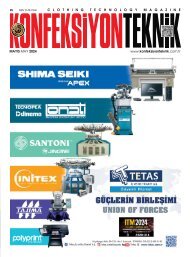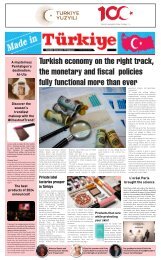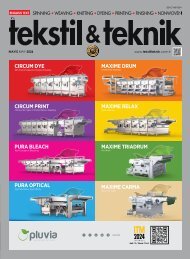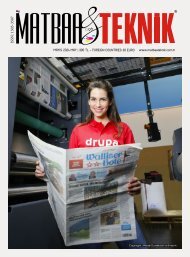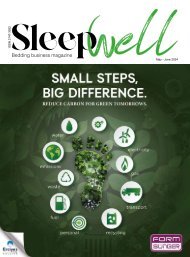You also want an ePaper? Increase the reach of your titles
YUMPU automatically turns print PDFs into web optimized ePapers that Google loves.
Monthly automotive aftermarket magazine<br />
GROUP CHAIRMAN<br />
H. FERRUH ISIK<br />
PUBLISHER:<br />
İstmag Magazin Gazetecilik<br />
İç ve Dış Ticaret Ltd. Şti.<br />
Managing Editor (Responsible)<br />
Mehmet Söztutan<br />
mehmet.soztutan@img.com.tr<br />
Advertising Sales Consultant<br />
Adem Saçın<br />
+90 505 577 36 42<br />
adem.sacin@img.com.tr<br />
Enes Karadayı<br />
enes.karadayi@img.com.tr<br />
International Marketing Coordinator<br />
Ayca Sarioglu<br />
ayca.sarioglu@img.com.tr<br />
Advisory Editor<br />
Yusuf Okçu<br />
yusuf.okcu@img.com.tr<br />
Finance Manager<br />
Cuma Karaman<br />
cuma.karaman@img.com.tr<br />
Digital Assets Manager<br />
Emre Yener<br />
emre.yener@img.com.tr<br />
Technical Manager<br />
Tayfun Aydın<br />
tayfun.aydin@img.com.tr<br />
Graphic & Design Advisor<br />
Sami aktaş<br />
sami.aktas@img.com.tr<br />
Accountant<br />
Yusuf Demirkazık<br />
yusuf.demirkazik@img.com.tr<br />
Subsciption<br />
İsmail Özçelik<br />
ismail.ozcelik@img.com.tr<br />
HEAD OFFICE:<br />
İstmag Magazin Gazetecilik<br />
İç ve Dış Ticaret Ltd. Şti.<br />
Ihlas Media Center<br />
Merkez Mah. 29 Ekim Caddesi No: 11B / 21<br />
Yenibosna Bahcelievler, Istanbul / TÜRKİYE<br />
Tel: +90 212 454 22 22<br />
www.img.com.tr sales@img.com.tr<br />
KONYA:<br />
Metin Demir<br />
Hazım Uluşahin İş Merkezi C Blok<br />
Kat: 6 No: 603-604-605 KONYA<br />
Tel: (90.332)238 10 71 Fax: (90.332)238 01 74<br />
EDİToR<br />
Mehmet Soztutan, Editor-in-Chief<br />
mehmet.soztutan@img.com.tr<br />
Dynamism prevails as usual<br />
The Turkish automotive industry, which was originally founded for<br />
import-substitution strategy and focused on the domestic market for a long period,<br />
transformed itself into a production base for a number of global brands.<br />
Competitiveness at the domestic level has been replaced with competitiveness on a<br />
global scale. In motor vehicles, a large number of the EU legislation was adopted.<br />
The Turkish automotive industry is one of the largest exporting and leading investor<br />
industries of the Turkish economy. It is an economically strategic sector in terms of<br />
its significant contribution to the national production and development, direct and<br />
indirect employment and level of technology in Türkiye.<br />
Following the shift of the focus on customers, markets, products and competition<br />
from the local level to the global level, Turkish automotive manufacturers and<br />
suppliers position themselves globally rather than locally.<br />
This transformation in the sector urges automotive suppliers to improve their existing<br />
structures in line with the demands of global auto manufacturers.<br />
Turkish producers of parts and components have attained high standards reflected by<br />
large export volumes to the Western countries.<br />
There are numerous producers of automotive components and services. More than<br />
half of these manufacturers compete in international markets and set high standards<br />
of export figures.<br />
Turkish automotive supplier industry produces almost all types of parts,<br />
components and spare parts such as engines and engine parts, power train parts<br />
and components, brake and clutch parts and components, hydraulic and pneumatic<br />
systems, suspension systems, security equipment, rubber and plastic parts, chassis<br />
frames and parts, electrical equipment and parts, lighting systems, accumulator<br />
batteries, seats etc.<br />
We think that innovation and competitive power will always assume a key position<br />
for the survival of the automotive spare parts industry.<br />
As known, we convey the messages of the Turkish automotive and the related<br />
industries by participating in a series of international fairs and exhibitions.<br />
We wish lucrative trade for all participants around the globe.<br />
PRINTED BY:<br />
İHLAS GAZETECİLİK A.Ş.<br />
Merkez Mahallesi 29 Ekim Caddesi İhlas Plaza<br />
No:11 A/41 Yenibosna–Bahçelievler/ İSTANBUL<br />
Tel: 0212 454 30 00<br />
www.ihlasmatbaacilik.com<br />
automotiveexport<br />
automotiveexports
Charging capacity, affordability<br />
hamper US electric vehicle shift<br />
The United States’ shift to electric vehicles has<br />
hit a speed bump, with woes about vehicle range<br />
and limited charging capacity adding to the main<br />
affordability issues.<br />
Automakers have pushed back EV sales targets<br />
and delayed capital projects as they seek to reduce<br />
inventories of unsold EVs at dealerships.<br />
“The slowdown in EV sales is much more pronounced<br />
than it is for other categories of vehicles and that isn’t<br />
related to the economy,” said Neil Saunders, managing<br />
director of GlobalData.<br />
“The EV has a problem attached to it,” he said.<br />
“It’s a much more difficult and complex purchase<br />
because of the range of the vehicles and the charging<br />
infrastructure.”<br />
American consumers are accustomed to often lengthy<br />
road trips for holidays or to visit friends and relatives,<br />
owing to the country’s large size and limited public<br />
transit options.<br />
But so far, the network of EV charging stations remains<br />
dodgy, with many areas either lacking infrastructure or<br />
equipped with unreliable machines.<br />
Range, pricing concerns<br />
More than three-quarters of drivers consider EVs<br />
reliable, according to a survey by the Consumer<br />
Technology Association (CTA), the organizer of the<br />
annual Consumer Electronics Show in Las Vegas.<br />
But there are also significant doubts among drivers<br />
surrounding the autos over inadequate charging<br />
infrastructure (36%), battery range (39%) and vehicle<br />
affordability (38%).<br />
The average EV sold in October for $51,762, some<br />
$13,000 below the year-ago level for the autos but<br />
almost $4,000 above the average price of all autos.<br />
In Europe, the elevated price of gasoline adds an<br />
incentive that allows consumers to overlook the lofty<br />
upfront cost of the vehicle.<br />
But that is less of a factor in the United States, where<br />
gas prices are only about half the level in France or<br />
Britain, according to Observatoire Cetelem 2024.<br />
Industry leaders such as Tesla Chief Executive Elon<br />
Musk have also pointed to increased borrowing costs<br />
as a drag after a series of Federal Reserve (Fed)<br />
interest rate hikes over the last year and a half.<br />
<strong>December</strong> <strong>2023</strong><br />
10
Tesla remains a dominant player in EVs, accounting for<br />
more than 55% of the 873,000 EV autos sold in the first<br />
10 months of <strong>2023</strong>, according to industry researcher<br />
Kelley Blue Book.<br />
Ford Chief Executive Jim Farley predicted “some<br />
bumpiness” in the evolving U.S. market.<br />
“The dynamic changes in the market – pricing,<br />
adoption rates, regulations – are forcing us to further<br />
reduce the cost of our EVs,” Farley said last month.<br />
Lowering costs<br />
Ford’s rival and fellow Detroit giant General Motors<br />
recently pushed back until the end of 2025 a plan to<br />
convert its Orion, Michigan plant for EVs “to better<br />
manage capital investment while aligning with evolving<br />
EV demand,” the company said last month.<br />
“In addition, we have identified engineering<br />
improvements that we will implement to increase the<br />
profitability of our products,” GM said.<br />
Ford and Tesla, too, are looking to simplify their<br />
manufacturing processes to limit costs.<br />
“Reducing the cost of our vehicles is our top priority,”<br />
said Tesla Chief Financial Officer Vaibhav Taneja.<br />
For its futuristic Cybertruck, which is expected to<br />
commence deliveries before the end of <strong>2023</strong>, Tesla<br />
is “doing everything possible to simplify that vehicle”<br />
to reach efficiency “that is unheard of in the auto<br />
industry,” Musk said.<br />
Ford also vowed to tweak its design and manufacturing<br />
to reduce complexity.<br />
But the results are still unproven, according to<br />
Deutsche Bank analyst Emmanuel Rosner.<br />
“What concerns us most is that automakers haven’t<br />
cracked the economics to make an easy, affordable<br />
EV,” Rosner said on CNBC.<br />
Washington has mobilized in favor of EVs during the<br />
presidency of Joe Biden, approving $7.5 billion in<br />
funds for EV chargers and extending tax credits up to<br />
$7.500 for consumer purchases of the autos.<br />
The Biden administration wants 50% of vehicle sales<br />
to be electric by 2030.<br />
“The politicians wanted it to happen overnight, but<br />
you can’t just set arbitrary targets; you’ve got to make<br />
sure the infrastructure’s there,” said Saunders of<br />
GlobalData.<br />
“The long-term trajectory is probably good for EVs,”<br />
but “it’s something that’s much slower-going,” he<br />
predicted.<br />
<strong>December</strong> <strong>2023</strong><br />
12
Auto production increases<br />
19 percent in October<br />
<strong>December</strong> <strong>2023</strong><br />
The automotive industry’s production increased by<br />
18.6 percent in October from a year ago to 136,177,<br />
data from the <strong>Automotive</strong> Manufacturers’ Association<br />
(OSD) have shown.<br />
Haberin Devamı<br />
Last month, more than 91,000 passenger cars<br />
were produced, pointing to a 46.7 percent increase<br />
compared with October 2022, while carmakers’<br />
commercial vehicle production plunged 15 percent to<br />
around 45,000.<br />
Pickup truck output was down 19 percent year-onyear,<br />
but bus production leaped 41 percent.<br />
In October, the market expanded 52 percent as a total<br />
of 105,154 vehicles were sold, with passenger car<br />
sales rising more than 74 percent to some 83,000,<br />
OSD said. Türkiye’s passenger car imports climbed<br />
77 percent to 52,482. The share of imported cars<br />
in the local market was 63.5 percent in October,<br />
declining from 66.5 percent in the previous month<br />
and 79 percent in August. The industry’s total vehicle<br />
shipments to foreign countries rose by 7.4 percent.<br />
Passenger car exports, on the other hand, increased<br />
31 percent from October 2022 to around 67,000.<br />
Export revenues amounted to $3.14 billion, marking a<br />
16 percent year-on-year increase.<br />
In the first 10 months of <strong>2023</strong>, carmakers produced<br />
a total of 1.2 million vehicles, a 12.4 percent increase<br />
compared with January-October last year, with<br />
passenger car output rising 23 percent to more than<br />
773,000.<br />
Total vehicle sales reached almost 1 million with a 62<br />
percent annual increase. Passenger car sales grew 68<br />
percent to 750,000.<br />
The automotive industry’s export revenues amounted<br />
to $29.3 billion in the January-October period, rising<br />
15.5 percent from a year ago.<br />
In terms of euro, exports increased by 12.8 percent to<br />
27.1 billion euros, according to OSD.<br />
16
Turkish automotive sector beating<br />
1 million milestones<br />
<strong>December</strong> <strong>2023</strong><br />
The automotive sector will exceed the “1 million”<br />
threshold in all three production, export and sales<br />
figures in <strong>2023</strong>, the 100th anniversary of the founding<br />
of the Republic of Türkiye. According to the latest data<br />
shared by Cengiz Eroldu, president of the <strong>Automotive</strong><br />
Industry Association (OSD), the total automotive<br />
production will reach 1.5 million units and exports will<br />
reach 1 million units by the end of the year.<br />
Sales will exceed 1.15 million units. With these results,<br />
the automotive market will break the historical record<br />
by exceeding the 1 million mark for the first time in<br />
history. Production and exports will catch up with<br />
2018, but will be slightly behind the historic year of<br />
2017, when 1.6 million units were produced and 1.1<br />
million units were exported.<br />
“The 60-year-old automotive industry, which has grown<br />
with the republic, now operates with a capacity of<br />
2 million units in 17 production facilities,” said OSD<br />
President Cengiz Eroldu at a press conference held in<br />
Istanbul to present the latest figures on the sector.<br />
“We are using 1.4 million units of that capacity. We<br />
have 13 members, and the members have 15 R&D<br />
centers. As a sector, we invest $1 billion annually<br />
and produce jobs for more than 500,000 people. We<br />
continue to contribute to Türkiye’s economy with<br />
annual exports of $30 billion and we continue to be the<br />
leader in this field.”<br />
By the end of <strong>2023</strong>, total automotive exports could<br />
reach $35 billion, Eroldu said, noting that automotive<br />
production exceeded 1 million units in the January-<br />
September period.<br />
“Both the growth of the domestic market and the<br />
growth of exports support the numbers of the<br />
automotive industry in <strong>2023</strong>. We have broken the 1<br />
million production barrier in the first nine months. This<br />
means that we have returned to our production figures<br />
before the pandemic.”<br />
Regarding vehicle sales, Eroldu said that while they<br />
foresee a 10 percent decline in the overall market<br />
in 2024, they do not expect a similar decline in<br />
production and exports.<br />
“We are hopeful on the export side, we think exports<br />
can cover the loss in the domestic market,” he added.<br />
Emphasizing that the automotive sector has been a<br />
foreign trade surplus sector for many years, Eroldu said<br />
the situation has worsened this year.<br />
22
“The share of domestic producers in total vehicle sales,<br />
which was 45 percent last year, has unfortunately<br />
dropped to 37 percent this year. The most important<br />
factor is the car. In automobiles, we have a domestic<br />
share that has gone from 39 percent to 31 percent.<br />
This is a situation that we do not want at all.<br />
Unfortunately, the sector that gives a surplus of $10<br />
billion is at the level of minus $318 million according<br />
to the first eight months figures, which will grow even<br />
more in September. The last negative value was<br />
realized in 2015 with minus $195 million.”<br />
Eroldu reiterated that the Special Consumption<br />
Tax (ÖTV) base should be updated to increase the<br />
domestic share of the market and to give consumers<br />
access to affordable vehicles. As of June, all cars sold<br />
in Türkiye entered the ÖTV base limit of 80 percent.<br />
<strong>December</strong> <strong>2023</strong><br />
23
Turkish auto sales see over<br />
55% increase to maintain record streak<br />
<strong>December</strong> <strong>2023</strong><br />
Car sales in Türkiye maintained their record trend<br />
in October despite tightening financing conditions,<br />
industry data showed, adding to the peaks since the<br />
beginning of the year.<br />
Backed by the increase in the supply of available cars,<br />
a record 101,367 passenger cars and light commercial<br />
vehicles were sold last month, the <strong>Automotive</strong><br />
Distributors and Mobility Association (ODMD) said in a<br />
statement, marking a 55.4% year-over-year increase.<br />
Car sales surged by 74.1%, totaling 82,611 units, the<br />
data showed, while the market for light commercial<br />
vehicles saw a more modest increase of 5.5%, with<br />
sales reaching 18,756 units.<br />
Demand soared as depreciation in the Turkish lira, and<br />
soaring prices prompted consumers to continue to opt<br />
for cars they see as a tool to safeguard themselves<br />
from high inflation, which rose to 61.5% in the 12<br />
months to September.<br />
The increase in October lifted the combined sales from<br />
January through October to a fresh record of 958,942<br />
units, marking a year-over-year growth of 63.7%.<br />
The figure surpasses the whole of 2022 when some<br />
783,283 cars and light commercial vehicles exchanged<br />
hands.<br />
The increase in car sales comes despite higher<br />
borrowing costs after the central bank aggressively<br />
tightened its monetary policy after the May elections to<br />
counter price rises.<br />
Higher interest rates, which cool the economy by<br />
making it more expensive to borrow and bearing<br />
down on spending, have contributed to bringing down<br />
inflation worldwide.<br />
26
Türkiye’s central bank has raised its benchmark oneweek<br />
repo rate by 2,650 basis points since June as<br />
part of a wider policy shift toward more conventional<br />
policymaking.<br />
Meanwhile, electric cars have also been booming this<br />
year, capturing a market share unseen to date, backed<br />
by the first homegrown battery-powered vehicle brand<br />
that has been adding momentum to its deliveries.<br />
Some 48,883 EVs have been sold from January<br />
through October of this year, the ODMD data showed,<br />
marking a ninefold increase from a year ago.<br />
Sales in October alone jumped tenfold to 9,832, lifting<br />
the EV share in the overall market to 11.9%.<br />
Togg, the manufacturer of Türkiye’s first electric car,<br />
outpaced Tesla as it delivered some 3,567 units of its<br />
C-segment SUV T10X in October. This figure brings its<br />
deliveries since late April to 9,171 units.<br />
Tesla sold 500 units of its Model Y last month. The<br />
carmaker has delivered some 10,700 units so far this<br />
year.<br />
<strong>December</strong> <strong>2023</strong><br />
28
Electric car makers race for<br />
supplies of lithium for batteries<br />
<strong>December</strong> <strong>2023</strong><br />
Threatened by possible shortages of lithium for electric<br />
car batteries, automakers are racing to lock in supplies<br />
of the once-obscure “white gold” in a politically and<br />
environmentally fraught competition from China to<br />
Nevada to Chile.<br />
General Motors and the parent company of China’s<br />
BYD Auto went straight to the source and bought<br />
stakes in lithium miners, a rare step in an industry that<br />
relies on outside vendors for copper and other raw<br />
materials. Others are investing in lithium refining or<br />
ventures to recycle the silvery-white metal from used<br />
batteries.<br />
A shortfall in lithium supplies would be an obstacle for<br />
government and industry plans to ramp up sales to<br />
tens of millions of electric vehicles a year.<br />
It is fueling political conflict over resources and<br />
complaints about the environmental cost of extracting<br />
them. Ford Motor has signed contracts stretching up<br />
to 11 years into the future with lithium suppliers on two<br />
continents. Volkswagen and Honda are trying to reduce<br />
their need for freshly mined ore by forming recycling<br />
ventures.<br />
Global lithium output is on track to triple this decade,<br />
but sales of electric SUVs, sports cars and sedans that<br />
rose 55 percent last year threaten to outrun that.<br />
30
Each battery requires about eight kilograms of lithium,<br />
plus cobalt, nickel and other metals.<br />
Adding to uncertainty, lithium has emerged as another<br />
conflict in strained U.S.-Chinese relations.<br />
Beijing, Washington and other governments see metal<br />
supplies for electric vehicles as a strategic issue and<br />
are tightening controls on access.<br />
Other governments including Indonesia, Chile and<br />
Zimbabwe are trying to maximize their return on<br />
deposits of lithium, cobalt and nickel by requiring<br />
miners to invest in refining and processing before they<br />
can export.<br />
GM is buying direct access to lithium by investing $650<br />
million in the Canadian developer of a Nevada mine. In<br />
return, GM says it will get enough for 1 million vehicles<br />
a year.<br />
BYD Auto’s parent company, battery maker BYD Co.,<br />
has announced more than $5 billion in investments in<br />
lithium mining and refining over the past 18 months.<br />
Despite rising output, the industry may face shortages<br />
of lithium and cobalt as early as 2025 if enough isn’t<br />
invested in production, according to Leonardo Paoli and<br />
Timur Gul of the International Energy Agency.<br />
“Supply side bottlenecks are becoming a real challenge,”<br />
said Paoli and Gul in a report last year. Alastair Bedwell<br />
of GlobalData said miners are reluctant to “go all out”<br />
on lithium until they are sure the industry won’t switch to<br />
batteries made with other metals.<br />
Developing lithium sources is a yearslong process.<br />
Mines that came online in 2010-19 took on average more<br />
than 16 years from discovery to the start of production,<br />
according to Paoli and Gul of the IEA.<br />
“These long lead times raise questions about the ability<br />
of supply to ramp up,” they wrote.<br />
Worldwide lithium resources are estimated at 80 million<br />
tons by the U.S. Geological Survey.<br />
Bolivia’s are the biggest at 21 millions tons, followed<br />
by Australia with 17 million and Chile with 9 million.<br />
China has 4.5 million tons of known reserves and the<br />
United States has 1 million. Forecasts of annual global<br />
production range as high as 1.5 million tons by 2030. But<br />
demand, if EV sales keep rising at double-digit annual<br />
rates, is forecast to increase to up to 3 million tons.<br />
<strong>December</strong> <strong>2023</strong><br />
32
Türkiye’s electric vehicle market<br />
charges toward 60K sales target<br />
<strong>December</strong> <strong>2023</strong><br />
The remarkable surge in Türkiye’s electric vehicle (EV)<br />
market growth becomes evident as October’s sales<br />
witnessed a significant uptick, propelling the market<br />
share of these vehicles to 11.0%, and indicating sales<br />
possibly hitting the 60,000 mark by year-end.<br />
According to data from the <strong>Automotive</strong> Distributors<br />
and Mobility Association (ODMD), sales of electric cars<br />
last month reached 9,087 units, posting a growth rate<br />
of 929%. In the first 10 months of the year, a total of<br />
43,682 electric cars were sold across the country, as<br />
per data. Furthermore, it is estimated that the electric<br />
car market will reach 60,000 units by the end of <strong>2023</strong>.<br />
The primary reason for the increase in electric car sales<br />
and market share is the introduction of new models,<br />
the report of Sabah indicated.<br />
Along with new models, the unprecedented boom in<br />
the EV market was backed by the first homegrown<br />
vehicle brand Togg, which began its deliveries earlier<br />
this year, and the entry of U.S. maker Tesla to the<br />
market. In the last quarter of the year, one of the<br />
world’s largest electric car manufacturers, the Chinese<br />
company BYD also entered the Turkish market.<br />
BYD initially launched the Atto 3 model and aims to<br />
trade its 1,500 units by the end of the year. In the first<br />
quarter of 2024, BYD plans to introduce the Han and<br />
Seal models and has a sales target of 10,000 units for<br />
2024. During the launch of the Atto 3, Ismail Ergun, the<br />
general manager of BYD Türkiye, mentioned that they<br />
have encountered significant demand through various<br />
communication channels.<br />
He pointed to the high interest in their models with the<br />
number of interested individuals exceeding 22,000. He<br />
also mentioned that they aim to achieve a market share<br />
of 10% or more depending on market conditions.<br />
“We have also introduced BYD Finance for our<br />
customers’ credit solutions, aiming to provide a quick<br />
and secure response to our customers’ credit needs.<br />
We have started sales with four dealerships, two in<br />
Istanbul, and one each in Ankara and Izmir. In 2024, we<br />
plan to increase the number of dealerships to over 20,”<br />
he said. By the end of 2022, there were 14,552 electric<br />
cars in Türkiye. As of the end of September, this rapidly<br />
increasing number has further increased to 51,219, a<br />
3.5-fold rise. According to ODMD’s data, 3,567 units<br />
of Togg’s SUV T10X were sold in October. This figure<br />
brings its deliveries since late April to 9,171 units.<br />
Meanwhile, Tesla’s estimated sales figure stands at<br />
around 10,000 units so far this year.<br />
Overall car sales in Türkiye maintained their record<br />
trend last month despite tightening financing<br />
conditions, the industry data showed, adding to the<br />
peaks since the beginning of the year.<br />
34
Tesla quarterly results<br />
disappoint as discounts bite<br />
Tesla’s results for the third quarter missed analyst<br />
estimates on Oct. 18, as the Elon Musk-run company<br />
was hit by higher costs and the fallout from price<br />
discounts.<br />
The Texas-based electric vehicle giant said sales in the<br />
July to September period reached $23.35 billion, lower<br />
than the $24.19 billion forecasted by analysts polled by<br />
Factset.<br />
The company also saw net profits come in less than<br />
hoped for, at 66 cents per share instead of 73 cents<br />
forecasted.<br />
Musk has undertaken multiple price cuts throughout<br />
<strong>2023</strong> on vehicles, telling investors in April that the<br />
company has taken the view that pushing for higher<br />
sales is the right choice versus taking a bigger margin.<br />
The move came as more EVs from legacy carmakers<br />
like General Motors and Ford are hitting dealerships.<br />
But those rivals have been punished by a major strike<br />
in the United States, something that Tesla will not have<br />
to navigate.<br />
The price cuts have made investors nervous and<br />
Tesla’s share price slid more than seven percent in the<br />
last month and was down more than three percent<br />
from its last closing price in afterhours trade.<br />
The Tesla stock valuation however still dwarfs other<br />
U.S. carmakers and it has more than doubled in <strong>2023</strong>,<br />
comforting Musk’s position as one of the world’s two<br />
richest people.<br />
Also rattling nerves, Tesla reported earlier this month<br />
that its new auto deliveries fell in the third quarter to<br />
435,059 units because of downtimes at factories in<br />
Shanghai and Austin.<br />
Production overall declined 10 percent from the<br />
second quarter to 430,488, according to the figures.<br />
<strong>December</strong> <strong>2023</strong><br />
36
Türkiye’s electric vehicle sales<br />
primed for 61% yearly expansion<br />
<strong>December</strong> <strong>2023</strong><br />
Sales of electric vehicles (EVs) in Türkiye are expected<br />
to register an annual average growth of nearly 61% in<br />
the coming years, a trend that is forecast to see the<br />
battery-powered cars’ share in the passenger vehicle<br />
segment soaring to over 30%, according to a report.<br />
EV sales have boomed this year, rising ninefold in the<br />
first ten months versus a year ago, propelled by the<br />
first domestically produced electric car brand, Togg, as<br />
well as the entrance of many global automakers such<br />
as Tesla. Sales are expected to grow by 60.8% a year<br />
on average until 2032, according to data compiled<br />
from the “Turkey Electric Vehicles Profile” country<br />
report by research firm BMI, a unit of Fitch Solutions.<br />
The growth is expected to elevate EVs’ share in total<br />
passenger car sales to 30.4%, it said.<br />
It would mark a twofold increase compared to BIM’s<br />
earlier forecast of 33.2% growth. The share of EVs in<br />
total car sales is expected to reach 4.1% this year, up<br />
from just 1.3% in 2022.<br />
Some 48,883 EVs have been sold from January<br />
through October of this year, according to the<br />
<strong>Automotive</strong> Distributors and Mobility Association<br />
(ODMD). The combined sales of electric and hybrid<br />
cars totaled 127,270 units.<br />
By 2032, the total number of electric passenger<br />
vehicles in Türkiye is forecast to surge to 259,500,<br />
according to the BIM report.<br />
Sales in October alone jumped tenfold to 9,832, lifting<br />
the EV share in the overall market to 11.9%.<br />
Togg, the manufacturer of Türkiye’s first electric car,<br />
outpaced Tesla as it delivered some 3,567 units of its<br />
C-segment SUV T10X in October. This figure brought<br />
its deliveries since late April to 9,171 units.<br />
Tesla sold 500 units of its Model Y last month. The<br />
carmaker has delivered some 10,700 units so far this<br />
year. The trajectory of increased EV sales is projected<br />
to continue into 2024, according to the BIM report.<br />
However, the imposition of taxes is anticipated to<br />
keep the overall market share of EVs in the automotive<br />
industry constrained for some time.<br />
Despite the limitation, the report suggests supportive<br />
measures may be instituted, particularly for Togg,<br />
serving as a catalyst for the widespread adoption of<br />
electric vehicles.<br />
38
Togg’s production is set to reach one million units by<br />
2030, with plans to commence exports to European<br />
markets by 2025. Besides the SUV, Togg will<br />
manufacture four other models – a sedan, C-hatchback,<br />
B-SUV and B-MPV – by 2030. The sedan will follow the<br />
mass production of the SUV. The current production<br />
capacity of around 100,000 vehicles per year will reach<br />
175,000 once Togg’s factory in the northwestern Bursa<br />
province reaches total capacity. Meanwhile, a significant<br />
upswing is also expected in the sales of commercial<br />
electric vehicles over the next few years. The surge is<br />
poised to be fueled by improvements in incentives and<br />
the expansion of charging infrastructure. The initiation of<br />
Tesla’s investment in charging infrastructure in Türkiye is<br />
predicted to strengthen the outlook for electric vehicle<br />
sales by 2032.<br />
<strong>December</strong> <strong>2023</strong><br />
40
Automechanika Frankfurt receives positive feedback on<br />
focus topics transformation and sustainability<br />
<strong>December</strong> <strong>2023</strong><br />
Registrations for Automechanika Frankfurt 2024<br />
are already around 20 per cent above the level of<br />
the previous event one year before the start of the<br />
trade fair. The focus topics of transformation and<br />
sustainability have also been very well received by the<br />
industry: Leading players have already announced that<br />
they will be presenting corresponding products and<br />
solutions for the aftermarket and original equipment<br />
from 10 to 14 September 2024. New event formats will<br />
foster discussions and networking on important topics<br />
such as circular economy, electromobility, alternative<br />
fuels, sustainability, connectivity, AI in cars and for<br />
service.<br />
The transformation of the automotive industry will<br />
be omnipresent throughout the fringe programme<br />
of Automechanika Frankfurt. Exhibitors can choose<br />
from a range of different event formats. A brand<br />
new addition is the Sustainability Court in Hall 5,<br />
where car manufacturers, suppliers and players<br />
from the automotive aftermarket can present their<br />
sustainable solutions and discuss them on stage as<br />
well as in the nearby networking area. At the Future<br />
Mobility Park, trade visitors can live experience and<br />
test vehicles with alternative drive systems and<br />
innovative future solutions. The top-class expert forum<br />
‘Innovation4Mobility’ will take place in Hall 3 for the<br />
second time. Lectures and discussion panels will cover<br />
the entire cosmos of topics related to the fundamental<br />
changes in the mobility industry.<br />
The fact that the industry is currently joining forces will<br />
also be demonstrated by the first Sustainability Day in<br />
Bologna on 17 November <strong>2023</strong>, initiated by the Forum<br />
on <strong>Automotive</strong> Aftermarket Sustainability (FAAS). Frank<br />
Schlehuber, Senior Consultant Market Affairs, CLEPA<br />
- European Association of <strong>Automotive</strong> Suppliers,<br />
comments: “With FAAS, we are now reaching an<br />
important milestone. Launched as an initiative at<br />
Automechanika Frankfurt 2022, suppliers and the parts<br />
trade are bundling their activities in a newly founded<br />
non-profit international association that represents and<br />
supports the automotive aftermarket on the path to<br />
sustainable business processes. The Sustainability Day<br />
offers the opportunity to learn from experts and build<br />
long-term networks that will drive the industry forward<br />
in terms of sustainability in the coming years.”<br />
Philippe Colpron, Head of ZF Aftermarket, also<br />
emphasises the importance of international<br />
partnerships: “We must strike a balance between being<br />
42
locally rooted and globally connected. At the same<br />
time, we need to foster innovative partnerships to<br />
address the evolving landscape of Next Generation<br />
Mobility, characterized by CASES megatrends<br />
(Connected, Autonomous, Shared, Electrified,<br />
Sustainable). The aftermarket sector demands fresh<br />
business models, enhanced service concepts, and<br />
a deeper understanding of customer expectations.<br />
Our pursuit of Zero Emissions, Zero Accidents, and<br />
Zero Downtime for every kilometer driven, while also<br />
creating sustainable growth opportunities for the<br />
aftermarket, can only be realized through collaborative<br />
efforts with our partners, for today and tomorrow.”<br />
Numerous companies return to<br />
Frankfurt after many years<br />
Olaf Mußhoff, Show Director Automechanika<br />
Frankfurt, about the current planning status: “We are<br />
experiencing a lot of demand for stand enlargements<br />
and are especially pleased that some renowned<br />
companies are back on board after a longer break.”<br />
This includes Borsehung, Exedy, Marelli Aftermarket,<br />
Niterra, SKF, Sogefi and Trucktec in the parts and<br />
components product area, 3M, Axalta, PPG and<br />
Spanesi for body and paint, Sonax for the trend topic<br />
of detailing and Airbest Industry, Cormach, OMCN,<br />
Rabotti, Rotar Marchinery Industrial for workshop<br />
equipment.<br />
The response to Automechanika Shanghai, which<br />
will take place from 29 November to 2 <strong>December</strong><br />
<strong>2023</strong> at the National Exhibition and Convention<br />
Center, is also almost at pre-corona levels with<br />
5,600 registered exhibitors. Michael Johannes, Vice<br />
President Mobility & Logistics at Messe Frankfurt: “All<br />
ten Automechanika trade fairs in <strong>2023</strong> far exceeded<br />
our expectations. Automechanika Shanghai will soon<br />
be the grand finale. China plays a pioneering role<br />
in the automotive industry as a centre for research,<br />
development and production. This becomes clear just<br />
by looking at the topics of around 60 events that will<br />
take place during the four days of the trade fair.”<br />
Exhibitor statements on the upcoming<br />
Automechanika Frankfurt 2024<br />
“We see us as a driving force in the challenge of<br />
making the aftermarket fit for e-mobility. In doing so,<br />
we focus on our customers’ need for economical and<br />
future-proof repair solutions.”<br />
Jens Schüler, CEO Schaeffler <strong>Automotive</strong> Aftermarket<br />
“Together with our customers, we want to shape<br />
the sustainable transport of the future and continue<br />
to be a strong innovator in the commercial vehicle<br />
industry in the original equipment and aftermarket.<br />
At Automechanika, we will showcase our vision of a<br />
holistic aftermarket ecosystem for the first time with<br />
Cojali by our side.” Andreas Wimmer, Member of the<br />
Management Board of Knorr-Bremse Systeme für<br />
Nutzfahrzeuge GmbH<br />
“We are incorporating the technological changes,<br />
e.g. the electrification of automobiles, into our<br />
software solutions and offer real added value through<br />
telematics data, for example. For us, the essential<br />
<strong>December</strong> <strong>2023</strong><br />
43
innovation lies in connecting all technologies and<br />
using artificial intelligence to simplify and accelerate<br />
processes.”<br />
Helmut Eifert, DAT Managing Director Innovations and<br />
International<br />
“In general, we believe that companies are increasingly<br />
better positioned as part of the transformation process.<br />
The extraordinary and volatile market situation in<br />
recent years has led to a rethink in the industry. With<br />
a new sustainability concept, we are helping repair<br />
businesses to operate profitably in the long term: with<br />
efficient processes, energy-saving products and digital<br />
tools, they can significantly increase their profitability<br />
and at the same time make a contribution to greater<br />
sustainability.”<br />
is based on the pillars of sustainability, design,<br />
functionality and user-friendliness. Together with them,<br />
we have implemented a unique product DNA in the<br />
wash industry that fulfils the needs of the operator and<br />
end user.”<br />
Marko Maricic, Head of International Sales, Otto Christ AG<br />
“The automotive industry has never stood still, but<br />
is changing at a rapid pace every year and we are<br />
keeping up with this change. Our tools are becoming<br />
lighter and we also offer innovative software solutions.<br />
We also aim not only to adapt to the latest materials<br />
and repair processes, but also to inspire and motivate<br />
the new generation of technicians.” Jürgen Braun,<br />
Sales/Technical Manager DACH Celette<br />
Jochen Kleemann, Director PPG Germany,<br />
Sales & Services GmbH<br />
“At Bosch, sustainability is deeply rooted in our<br />
corporate values and has not just recently become<br />
part of our day-to-day business. For more than 50<br />
years, Bosch <strong>Automotive</strong> Aftermarket has been<br />
offering circular products. By 2030, we will more than<br />
double our circular business in the aftermarket with<br />
remanufacturing, reuse, repair and recycling.” Peter<br />
Lukassen, Head of Operational Sustainability at Bosch<br />
“Our customers are the centre of our focus and are<br />
also the drivers of our innovation process, which<br />
<strong>December</strong> <strong>2023</strong><br />
44
Ford Otosan unveils Yeniköy<br />
factory, bolsters Türkiye’s EV focus<br />
<strong>December</strong> <strong>2023</strong><br />
Ford Otosan, a joint venture of Türkiye’s conglomerate<br />
Koç Holding and the U.S. automotive giant Ford,<br />
opened its Yeniköy factory in northwestern Kocaeli with<br />
the participation of President Recep Tayyip Erdoğan<br />
following the redesigning and modernization process<br />
initiated with the support of authorities in 2021.<br />
Ford Otosan chair of the Board and Koç Holding<br />
deputy chair of the board of directors Ali Koç stated<br />
that the renewed factory will strengthen their position<br />
as Europe’s leading electric commercial vehicle<br />
manufacturer, Anadolu Agency (AA) reported.<br />
“However, our dreams for the future go far beyond<br />
these. Our Yeniköy factory will serve these dreams,”<br />
he said. Highlighting that they continue to invest in<br />
Türkiye’s future, Koç said, “As we enter the second<br />
century of the republic, we are placing our Yeniköy<br />
factory, which we call ‘the factory of the future,’ into<br />
service by enlarging it approximately fourfold and<br />
further modernizing it.”<br />
“The first step of this great happiness was taken at<br />
the meeting we held on March 16, 2021, again in the<br />
presence of our president, this time hosted by you<br />
(Erdoğan), you encouraged us with the support and<br />
encouragement of our state and we took the first step<br />
there,” Koç recalled.<br />
“In such an uncertain period, we announced our<br />
strategic investment of 2 billion euros ($2.14 billion),<br />
calling it ‘our vision for the future.’ This figure is the<br />
largest investment in the Turkish automotive industry,”<br />
he underscored.<br />
“It is also an ambitious vision project whose impact<br />
will last at least 10 years. On that day, we said, ‘As<br />
Europe’s commercial vehicle production leader<br />
and Türkiye’s export champion, we will also lead<br />
the electrification transformation of the automotive<br />
industry,’” Koç noted. The Kocaeli facility, located in<br />
the Gölcük district, is the largest commercial vehicle<br />
production hub for Ford in Europe.<br />
Wishing the plant, which employs 3,500 people, to<br />
be beneficial, Erdoğan on the other hand, said: “This<br />
facility, which is a reflection of the engineering and<br />
production power of the world brand Ford, deserves<br />
the title of the factory of the future with its pioneering<br />
features. It stands out with its production of both<br />
internal combustion and electric vehicles.”<br />
Emphasizing the factory’s potential, Erdoğan further<br />
said it would host the production of the new generation<br />
Transit Custom, as well as the electric Transit and<br />
Volkswagen’s 1-ton commercial vehicle.<br />
“I hope that the new version of Transit Custom,<br />
Europe’s bestselling van class vehicle, will be beneficial<br />
to its customers in our country and around the world.”<br />
“That we have elevated to the 13th place from the<br />
15th place in production in five years shows that we<br />
are advancing toward the right direction,” President<br />
Erdoğan said. “What is more, we have achieved<br />
this despite successive global crises. Last year, our<br />
automobile exports had a foreign trade surplus of over<br />
$9 million.”<br />
‘Growing interest in EVs’<br />
“We, as Türkiye, are determined to preserve our<br />
production and export potential, which we have<br />
obtained by swiftly adopting the technological<br />
transformations in the automobile production market.<br />
We attach special importance to the investments<br />
that will give us a say in electric and hybrid vehicle<br />
production, which is growing exponentially. As is the<br />
case in the entire world, there is a growing interest in<br />
electric vehicles in Türkiye as well,” Erdoğan noted.<br />
Stressing that 14 million electric vehicles are expected<br />
to be sold this year across the world, President<br />
Erdoğan added: “Apparently, with the new actors<br />
breaking into the market along with the already-present<br />
ones, the competition in this area will get increasingly<br />
fiercer.”<br />
“With the interest triggered by the Togg hitting the<br />
road, we march on the path to having a rapidly<br />
developing electric vehicle market. Our aim is to make<br />
our country one of the world’s leading actors in electric<br />
vehicle and battery production.”<br />
Highlighting the development in the electric vehicle<br />
sector, whose sales boomed this year, increasing<br />
approximately ninefold in the first 10 months of <strong>2023</strong><br />
when compared to last year, according to official data,<br />
Erdoğan said, “We, as a country that has already<br />
reached a production capacity of 70 gigabytes per<br />
hour in electric vehicle batteries, are determined to<br />
become the battery production hub of Europe.<br />
46
Türkiye’s energy landscape reshaping<br />
as renewables gain momentum<br />
<strong>December</strong> <strong>2023</strong><br />
Türkiye’s electricity installed capacity has increased<br />
by more than threefold in the past two decades, while<br />
renewable energy share has reached approximately<br />
55% of the existing installed capacity, Deputy Minister<br />
of Energy and Natural Resources Abdullah Tancan<br />
said.<br />
“Electricity installed capacity, which was 31,846<br />
megawatts (MW) in 2002, has increased 3.3 times to<br />
reach 105,135 MW by the end of July,” said Tancan at<br />
the opening of the 16th EIF Energy Congress and Fair<br />
held in the southern province of Gaziantep.<br />
Looking at electricity production, Tancan noted that<br />
electricity production had reached 326 billion kilowatts<br />
(kW) by the end of last year, and Türkiye ranks 5th in<br />
renewable energy installed capacity in Europe and 12th<br />
globally.<br />
He also highlighted the country’s position in equipment<br />
production, saying: “We are currently ranked 13th<br />
globally and 6th in Europe in equipment production.<br />
We have made significant progress in installed<br />
capacity and production of renewable sources over<br />
the past 21 years, with electricity installed capacity<br />
increasing 3.3 times from 31,846 megawatts in 2002 to<br />
105,135 megawatts by the end of July.”<br />
“We have increased the share of renewable energy in<br />
electricity production to 42%. Currently, our country<br />
has approximately 10,398 MW of solar installed<br />
capacity, with 10,169 solar energy production<br />
facilities,” he noted. Pointing out that<br />
there are significant goals regarding<br />
solar energy in the National Energy<br />
Plan, Tancan said: “By 2035, we aim<br />
to add an average of 3.5 gigawatts<br />
per year, with 52 gigawatts out of 189<br />
gigawatts of installed capacity being<br />
derived from solar energy sources.”<br />
“Solar energy will be one of the<br />
fundamental components of energy<br />
in the near future and will continue<br />
to grow. Additionally, producing local<br />
products has become important.<br />
In the fields of wind and solar,<br />
many equipment items are now<br />
being produced in Türkiye, with the<br />
localization rate of panels reaching<br />
up to 80%,” he added.<br />
Kutay Kaleli, head of the International<br />
Solar Energy Society (ISES) Türkiye Section<br />
(GÜNDER) for his part, noted that 150,000 people are<br />
directly employed in the solar energy sector, stating<br />
that panel factories with a production capacity<br />
of approximately 30,000 megawatts have been<br />
established in Türkiye.<br />
“With all the investments made in solar energy,<br />
we have become the 3rd largest panel-producing<br />
country in the world. We opened the 5th EVA factory,<br />
which is important in solar technology,” Kaleli said.<br />
Çiğdem Dilek, chairperson of the EIF Congress<br />
Executive Board, stated that recent technological<br />
developments have taken a more prominent place in<br />
Türkiye’s energy agenda.<br />
She emphasized that self-consumption and<br />
distributed energy are at the forefront of investors’<br />
agendas and said: “In Türkiye, legislation work on<br />
topics such as hydrogen and charging stations is on<br />
the agenda and progressing rapidly. We will continue<br />
to see new technological developments.”<br />
“If an energy picture of Türkiye were to be taken,<br />
sector representatives would need to come to EIF.<br />
By organizing these events in cities where investors<br />
and equipment productions are located, we produce<br />
new opportunities. That’s why we organized EIF<br />
in Gaziantep. We have also received invitations to<br />
organize this event from Malatya, Kahramanmaraş,<br />
Adıyaman and Şanlıurfa,” Dilek explained.<br />
48
Japan’s automakers unveil EV galore,<br />
vie for supremacy at Tokyo show<br />
<strong>December</strong> <strong>2023</strong><br />
“We love battery EVs,” said the executive in charge of<br />
electric vehicles at Toyota Takero Kato not once, but<br />
twice, to underscore what he considers the message at<br />
this year’s Tokyo auto show.<br />
It’s a message ringing clear at the Tokyo Mobility Show,<br />
which will run through Nov. 5 at Tokyo Big Sight Hall,<br />
where battery-powered electric vehicles are the star at<br />
practically every booth.<br />
Mazda Motor Corp. is highlighting a sportscar concept<br />
that is a plug-in EV packed with its signature rotary<br />
engine. Honda Motor Co. is showing off its Prelude<br />
sportscar EV concept. Toyota Motor Corp.’s lean<br />
angular Lexus concept, set to sell in 2026, is an electric<br />
vehicle running on lithium-ion batteries.<br />
Journalists got a preview ahead of the show’s public<br />
opening.<br />
U.S. automakers like General Motors Co. and Ford<br />
Motor Co. aren’t exhibiting at the show and have not<br />
taken part for some years. The Americans make up a<br />
very tiny fraction of Japanese auto sales and have had<br />
a hard time cracking a market where domestic makers<br />
remain powerful.<br />
Among the foreign makers taking part are Mercedes-<br />
Benz, a perennial Japanese favorite and China’s BYD.<br />
Kato denied he repeated his words because he is<br />
worried Toyota isn’t perceived as loving EVs enough.<br />
Toyota executives have acknowledged that Japan’s top<br />
automaker has fallen behind rivals in EV development<br />
like Tesla of the U.S. and China’s BYD Auto. That is<br />
partly because of Toyota’s past success in hybrids,<br />
exemplified in the Prius, which has a gasoline engine<br />
and an electric motor.<br />
Toyota already sells a tiny two-seater called C+pod<br />
and the bZ4X, co-developed with group company<br />
Subaru, as electric offerings, but not much else. And it<br />
is eager to play catchup.<br />
As the first serious EV from Toyota, the Lexus LF-ZC<br />
will serve as a true test for how Toyota fares in a sector<br />
that still comprises a minority of the global market but<br />
is growing quickly, given priorities like climate change.<br />
In Japan, EVs make up less than 5% of the auto<br />
market, according to the International Energy Agency<br />
(IEA). In the U.S., where Tesla dominates, EVs account<br />
for just under 10% of auto sales, although President<br />
Joe Biden is pushing for requiring at least 54% of new<br />
vehicles sold in the U.S. to be electric by 2030. In<br />
China, a third of vehicles sold are EVs.<br />
Tesla’s global vehicle deliveries last year grew 40%<br />
from the previous year to 1.31 million EVs. BYD sold<br />
more than 1.85 million electric cars, including plug-ins.<br />
52
<strong>December</strong> <strong>2023</strong><br />
Toyota, meanwhile, sold fewer than 25,000 EVs<br />
worldwide last year, although in the first eight months<br />
of this year, it sold 65,000, mostly outside Japan.<br />
Toyota is targeting sales of 1.5 million EVs a year by<br />
2026 and 3.5 million by 2030.<br />
“We are looking toward an electrified future that we<br />
hope to build together with our customers,” Kato said.<br />
Catching up is challenging but not impossible, said<br />
Joshua Cobb, senior automobiles analyst at BMI.<br />
“Over the short term, we see Chinese EVs from brands<br />
such as BYD, SAIC-GM-Wuling and Tesla-branded<br />
EVs will continue to gain market share as there is little<br />
competition at the moment,” he said.<br />
But, Cobb added, “One thing not to underestimate is<br />
the strong brand loyalty in Japan.” He said Japanese<br />
consumers may hold off on EV purchases until more<br />
domestic models hit the market.<br />
Nissan, an early EV maker among the Japanese with<br />
its Leaf going on sale in 2010, is showcasing four EV<br />
concept cars. Among them is the Hyper Tourer minivan<br />
concept that Nissan says has advanced technologies<br />
like autonomous driving. It runs on high-energy-density<br />
solid-state batteries. Senior Vice President Alfonso<br />
Albaisa said Nissan is focusing on virtual reality and<br />
other breakthroughs that allow vehicle designers to<br />
shorten model development time.<br />
“At Nissan, we have been racing forward with our<br />
dramatic digital shift just as other industries, like<br />
gaming,” Albaisa said.<br />
Manufacturers also note that EV technology is<br />
changing how a vehicle drives.<br />
Batteries and a motor for an EV generally take up less<br />
space than a gas combustion engine. That means<br />
EVs can have a lower center of gravity while offering<br />
more cabin space, making it a nifty powertrain for<br />
sportscars, vans, pickups and SUVs.<br />
In Nissan and elsewhere, a key issue for EVs is battery<br />
charge time and driving range. While all the world’s<br />
major automakers are working to shorten charge time<br />
and lengthen cruise time per charge, the U.S. startup<br />
Ample has developed a different solution – battery<br />
swapping. Instead of charging the battery in the car,<br />
a module containing the battery is taken out and<br />
replaced by a fully charged battery at a drive-in facility<br />
built especially for the procedure. The swap, done by<br />
robots, takes just five minutes.<br />
The approach is already being used by Uber drivers<br />
in the San Francisco area. Ample’s battery-swapping<br />
arrives in Japan this winter through a partnership with<br />
Mitsubishi Fuso, a Daimler group truck company. The<br />
swapping is being demonstrated at Mitsubishi Fuso’s<br />
booth. De Souza said another attraction of battery<br />
swapping is its greenness. A battery can be charged<br />
flexibly, using renewable energy at times of the day<br />
with low demand for power, he said.<br />
“We decided what worked really well about gas is<br />
that you stop for a few minutes,” said John de Souza,<br />
Ample’s president and founder.<br />
54
World Bank provides financing<br />
for greening of Turkish firms<br />
<strong>December</strong> <strong>2023</strong><br />
The World Bank Board has approved a $155 million<br />
loan for the greening of firms through equity financing,<br />
and mobilized private capital and expanded climate<br />
financing in Türkiye’s capital markets.<br />
The funds will be channeled by the Industrial<br />
Development Bank of Türkiye (TSKB), which will use<br />
them to partially capitalize a Türkiye Green Fund (TGF),<br />
the World Bank said in a statement.<br />
The TGF will provide equity financing to green and<br />
greening companies. It will be managed by Maxis<br />
Private Equity Portfolio Management, one of Türkiye’s<br />
largest asset management companies and a Project<br />
Implementing Entity under the project.<br />
The project’s total size is expected to reach $405<br />
million by mobilizing private capital in the amount of a<br />
combined $250 million at the fund level and investee<br />
level, in addition to the World Bank loan, according to<br />
the statement.<br />
The project aims to support firms’ decarbonization<br />
and investments in green technologies, development<br />
of the Private Equity industry through a demonstration<br />
green fund, financial sector diversification and<br />
development of firms’ access to diversified sources of<br />
long-term finance, lowering high corporate leverage,<br />
and accelerate financing for the green transition and<br />
enhanced climate action.<br />
For Türkiye to reach its intended green objectives,<br />
firms need to decarbonize, the statement said.<br />
56
China to curb exports of graphite<br />
citing national security concerns<br />
China will demand export permits for some graphite<br />
products to safeguard national security, its commerce<br />
ministry said, in its latest move to control supplies<br />
of critical minerals in response to hurdles over its<br />
manufacturing dominance.<br />
China is the world’s top graphite producer and<br />
exporter and also refines over 90% of the world’s<br />
graphite into the material that is used in virtually all<br />
EV battery anodes, which is the negatively charged<br />
portion of a battery.<br />
Beijing is requiring export permits when many foreign<br />
governments are increasing their pressure on Chinese<br />
companies over their industrial practices.<br />
The European Union is weighing levying tariffs on<br />
Chinese-made EVs, arguing they unfairly benefit from<br />
subsidies. Also, the U.S. government widened curbs<br />
on Chinese companies’ access to semiconductors,<br />
including stopping sales of more advanced artificial<br />
intelligence chips made by Nvidia.<br />
The ministry said the move was “conducive to<br />
ensuring the security and stability of the global supply<br />
chain and industrial chain and conducive to better<br />
safeguarding national security and interests.”<br />
It added that it was not targeting any specific country.<br />
Top buyers of graphite from China include Japan, the<br />
United States, India and South Korea, according to<br />
Chinese customs data.<br />
Under the new restrictions, China will require as of<br />
Dec. 1 that exporters apply for permits to ship two<br />
types of graphite, including high-purity, high-hardness<br />
and high-intensity synthetic graphite material, and<br />
natural flake graphite and its products.<br />
Three types of “highly sensitive” graphite items had<br />
already been under temporary controls, the commerce<br />
ministry said, and are included in the new list.<br />
Meanwhile, it dropped temporary controls on five less<br />
sensitive graphite items used in basic industries such<br />
as steel, metallurgy, and chemicals.<br />
The new measures will ensure the domestic supply<br />
of graphite for military use, such as in the aerospace<br />
sector, as well as domestic battery-making, said<br />
Chang Ke, an analyst at consultancy Mysteel.<br />
With rising sales of electric vehicles, automakers are<br />
racing to lock in supplies from outside China, but<br />
shortages are looming.<br />
“It’s a restriction on EV material flowing out as many<br />
new energy companies are increasingly building up<br />
more plants overseas,” Chang said.<br />
Shares in China’s new energy vehicle and battery<br />
makers rose after the announcement.<br />
The curbs are similar to those in place since Aug. 1<br />
for two chip-making metals, gallium and germanium.<br />
The restrictions have slashed exports of those metals<br />
from China recently and pushed up prices outside of<br />
the country. Analysts said it was not clear how much<br />
impact the new measures on graphite would have in<br />
the short term.<br />
“This control is not a complete ban, and there has<br />
been no significant impact on any industry during the<br />
previous temporary control,” said Ivan Lam, a senior<br />
analyst at Counterpoint Research.<br />
Prices for natural flake graphite were 3,950 yuan<br />
($539.62) a metric ton, down 25.5% from the<br />
beginning of this year because of declining demand<br />
from the EV sector, according to Mysteel.<br />
However, Counterpoint’s Lam said that graphite prices<br />
are likely to rise.<br />
“We believe that the average price of graphite will<br />
continue to rise in the future due to supply and<br />
demand imbalances, including Russia, which was<br />
one of the major graphite suppliers before the Russia-<br />
Ukraine war,” he said.<br />
<strong>December</strong> <strong>2023</strong><br />
58
Turkish defense industry ‘will move forward’<br />
The defense industry is the leading sector of the<br />
national technology movement, Industry and<br />
Technology Minister Fatih Kacır has said, adding that<br />
the sector will be in a much better position than today<br />
in the future.<br />
“Türkiye is a country that has been fighting terrorism<br />
for nearly 40 years and unfortunately has not been able<br />
to see its allies from time to time in this fight and has<br />
not been able to find the opportunity to access the<br />
defense industry systems it needs from time to time,<br />
despite paying for them,” Kacır said on Nov. 8 during<br />
talks on his ministry’s 2024 budget in a parliamentary<br />
commission.<br />
“This has led Türkiye, especially in the last 20 years, to<br />
develop all of its critical platforms, including air, land,<br />
naval and space systems, domestically and nationally<br />
in the defense industry to meet its own needs,” he<br />
added. Noting that the first flight of the national fighter<br />
is expected to take place by the end of <strong>2023</strong>, Kacır<br />
said that the performance tests of the Hürjet project<br />
will continue.<br />
“The Atak helicopter, our national helicopter, is in<br />
service,” he added.<br />
“Let us make it very clear, we will not retreat even<br />
one inch from these projects, on the contrary, we will<br />
develop these projects much further than today for the<br />
peace, welfare and security of 85 million citizens living<br />
in Türkiye, for our independence and our future.”<br />
Kacır also noted that the brain drain abroad has<br />
improved.<br />
“According to the brain drain statistics referred to<br />
by the World Bank, in the ranking of 179 countries in<br />
<strong>2023</strong>, our country has improved 21 places in the last<br />
six years, from 112 to 134,” the minister said.<br />
<strong>December</strong> <strong>2023</strong><br />
60
Chinese brands increasing share in Turkish auto market<br />
<strong>December</strong> <strong>2023</strong><br />
Chinese carmakers are fast increasing their share in the<br />
Turkish market, but subsidies the Chinese companies<br />
receive from their government may lead to unfair<br />
competition, warns Baran Çelik, the board chair of the<br />
Uludağ <strong>Automotive</strong> Industry Exporters’ Association<br />
(OİB). Chinese companies are aiming to consolidate<br />
their positions in the auto markets with the help of the<br />
large subsidies they enjoy, Çelik said.<br />
“They have a destructive approach in competition,<br />
such as weakening competitors and ensuring that they<br />
are eliminated from the market. This may turn into an<br />
unfair competition in the future.”<br />
Türkiye should use all its rights regarding customs<br />
investigations provided by the World Trade<br />
Organization, according to Çelik. In the whole of 2022,<br />
only 3,456 Chinese-made cars were sold in Türkiye,<br />
but in the January-October period of this year, a total<br />
of 43,562 Chinese cars were sold. They appeal to local<br />
consumers because they are affordable and highquality<br />
cars. However, governments and domestic<br />
manufacturers are cautious about the risks that may<br />
arise in the foreign trade balance and the competition<br />
in the market. The prices of those vehicles will not<br />
remain at the same level once those companies gain<br />
certain market power, Çelik said.<br />
“Although it may seem like an advantage for<br />
consumers in the short term, in the long term, after<br />
they gain a market share, there may come a time when<br />
unfair competition begins.”<br />
The only way to prevent this is to break the power<br />
subsidized by tariffs, Çelik argued.<br />
The automotive industry, which has been Türkiye’s<br />
largest exporting industry for the past 15 years, had<br />
been posting a foreign trade plus. But this is about to<br />
change in <strong>2023</strong>.<br />
“The auto industry’s annual export revenues are over<br />
$30 billion. This year, we may post a foreign trade<br />
deficit of around $1 billion to $2 billion,” Çelik said,<br />
warning that the deficit may further increase to $3.5<br />
billion to $4 billion in the future. The biggest reason<br />
for this is the decrease in the share of domestic<br />
automobiles in sales, according to Çelik.<br />
“We started selling less of what we produced to the<br />
domestic market. On the other hand, the number<br />
of vehicles we imported in the upper segment also<br />
increased. Especially electric vehicles disrupt our<br />
foreign trade balance,” Çelik said. In order to maintain<br />
the balance in foreign trade, “we need to produce and<br />
export electric vehicles,” he added. Electric vehicle<br />
sales skyrocketed to 890 percent in the January-<br />
October period from a year ago to 48,883, according to<br />
the data from the <strong>Automotive</strong> Distributors’ and Mobility<br />
Association (ODMD). Electric vehicles accounted for<br />
6.5 percent of all vehicle sales in the first 10 months.<br />
64
Time has come for Central Bank<br />
digital currencies to prove their worth<br />
<strong>December</strong> <strong>2023</strong><br />
The European Central Bank’s (ECB) milestone step<br />
toward introducing a digital euro in the coming years<br />
signifies a crucial moment for the newest incarnation<br />
of money to demonstrate its value and relevance in the<br />
evolving financial landscape.<br />
A few countries have introduced central bank digital<br />
currencies (CBDCs). China is trialing a prototype yuan<br />
with 200 million users, India is gearing up for a pilot,<br />
and some 130 countries representing 98% of the<br />
global economy are exploring digital cash.<br />
The ECB’s move to establish a pilot that could lead<br />
to a digital currency for the 20 countries that use the<br />
common currency, making it the first heavyweight<br />
Western central bank to forge ahead formally, could<br />
become a global blueprint.<br />
Supporters say CBDCs will modernize payments with<br />
new functionality and provide an alternative to physical<br />
cash, which seems to be in terminal decline.<br />
But questions remain about why CBDCs represent an<br />
advance, with uptake low in countries such as Nigeria<br />
that have adopted them, as well as protests against the<br />
ECB’s plans, showing public concern about snooping.<br />
Commercial bankers fret about the costs and possible<br />
deposit bleeds as customers could move money into<br />
central bank accounts, while developing countries<br />
worry that an easily accessible digital dollar, euro, or<br />
yuan could cause havoc in their systems.<br />
’What is money?’<br />
The ECB’s plan “is a very big deal, and a lot of the rest<br />
of the world is watching this closely,” said Josh Lipsky,<br />
who runs a global CBDC tracker at the Atlantic Council.<br />
“It is one of the biggest central banks, so if it comes up<br />
with answers to the privacy and cybersecurity issues<br />
and the ability to use it offline, it will be very influential.”<br />
Five years ago, central banks were spooked into<br />
action when Facebook floated plans for a breakaway<br />
currency. Now, though, policymakers have yet to<br />
persuade many why CBDCs are needed fully.<br />
Fabio Panetta, the ECB Executive Board member<br />
overseeing the bank’s digital euro work, said it would<br />
help “future-proof” the currency and reduce what he<br />
called an over-reliance on the payment systems of<br />
U.S.-based credit cards.<br />
But experts are scratching their heads.<br />
“It’s not yet clear what the thing is that could be done<br />
with a retail CBDC that couldn’t also be replicated with<br />
commercial bank money,” said Barclays’ managing<br />
director of advanced technologies, Lee Braine, who<br />
has been involved in some of the Bank of England’s<br />
digital pound projects. “You are potentially breaking<br />
some of the singleness of money,” he said, flagging<br />
the risk of a two-tier system if CBDCs are allowed<br />
different functionality or data disclosure rules than<br />
bank accounts.<br />
“This all comes down to, what is money?”<br />
Defining a global standard<br />
A key unknown is whether the U.S. Federal Reserve or<br />
Bank of Japan will launch retail CBDCs.<br />
India could be a more effective test environment than<br />
China because, while each Asian giant has more than 1<br />
billion people, India has a far more open economy.<br />
In contrast, Canada and others appear to be tapping<br />
the brakes, while most of those already using CBDCs<br />
are seeing very little interest.<br />
Data this month from the Bahamas, which launched<br />
the world’s first digital currency in 2020, showed<br />
personal transactions of its SandDollar were down<br />
11% in the first seven months of the year while wallet<br />
top-ups had plunged fourfold.<br />
A May International Monetary Fund (IMF) paper<br />
described public adoption of Nigeria’s eNaira as<br />
“disappointingly low,” with 98.5% of wallets never even<br />
used.<br />
“The current adoption level of eNaira has been<br />
reflective of the early stage of CBDC awareness,”<br />
the country’s central bank said in a written response<br />
to questions, adding it had been “consistent” with<br />
expectations.<br />
66
Türkiye looking into Russia’s road map for gas hub<br />
Russia has prepared a road map for the proposed gas<br />
hub and submitted it to Türkiye, Deputy Prime Minister<br />
Alexander Novak said, also stressing Azerbaijan’s<br />
intention to join the initiative.<br />
The Kremlin last October floated the idea of producing<br />
a major gas-trading hub in Türkiye as Moscow worked<br />
to reroute its energy exports after European countries<br />
sharply cut their imports from Russia in response to its<br />
actions in Ukraine.<br />
The plan followed unexplained explosions that<br />
damaged Nord Stream gas pipelines linking Russia<br />
with Germany under the Baltic Sea.<br />
The project has garnered significant attention from<br />
both Türkiye and Russia, with other nations expressing<br />
interest as well, according to Novak.<br />
“This project has attracted intense interest from both<br />
Türkiye and Russia. Additionally, there are other<br />
potential participants. For instance, Azerbaijan is also<br />
prepared to be part of the project,” he told Anadolu<br />
Agency (AA) on the sideline of the Russian Energy<br />
Week in Moscow.<br />
He also highlighted the potential for further<br />
international collaboration.<br />
“We believe that other countries can also participate<br />
as gas suppliers. Establishing an electronic trading<br />
platform would be suitable, especially for Europe and<br />
Southeast Europe, to determine gas prices based on<br />
the volumes to be sold there,” he noted.<br />
The project envisages the setting up of an electronic<br />
platform for gas sales in Türkiye.<br />
Novak underscored the ongoing efforts in the<br />
establishment of the gas center and said a draft of the<br />
project has been prepared and is being considered by<br />
Türkiye.<br />
“This project is being discussed now, a roadmap has<br />
been drafted and it has been submitted to Turkish<br />
partners. They are studying it now. As soon as it is<br />
signed it will be implemented as planned,” he told an<br />
interview with RT Arabic.<br />
“A road map has been prepared in collaboration with<br />
Gazprom and BOTAŞ, and adjustments are being<br />
made,” he noted, stressing hopes the project would<br />
<strong>December</strong> <strong>2023</strong><br />
68
e signed in the near future, paving the way for its<br />
implementation.<br />
Putin also echoed the aim to expand energy<br />
cooperation and the realization of a natural gas hub<br />
project with Türkiye during his speech at the Russian<br />
Energy Week.<br />
Also speaking on the sidelines of the event, Turkish<br />
Energy and Natural Resources Minister Alparslan<br />
Bayraktar said discussions regarding the project were<br />
taking place with Russian energy giant Gazprom, and<br />
stressed collaboration with Russia on various energyrelated<br />
fields will continue.<br />
Türkiye already serves as a major transit country for<br />
Russian gas, which is being shipped through the<br />
Black Sea via two pipelines. The Blue Stream and the<br />
Turkstream boast a combined capacity of almost 48<br />
billion cubic meters (bcm) per year.<br />
Novak said Russia and Türkiye have a history of<br />
successful cooperation in the energy sector.<br />
He credited the success of these projects to the<br />
agreements reached between President Recep Tayyip<br />
Erdoğan and Russian President Vladimir Putin.<br />
“Gazprom and BOTAŞ are jointly implementing these<br />
projects, and the pipelines are operating successfully.<br />
Deliveries are being carried out seamlessly in line with<br />
the design capacity. Therefore, I believe successful<br />
collaborations have been conducted in the energy<br />
sector, particularly in the natural gas industry.”<br />
The implementation of the gas hub project aiming<br />
at redirecting supplies and exporting them to the<br />
European market was delayed after devastating<br />
earthquakes jolted southeastern Türkiye in early<br />
February, causing widespread destruction across<br />
the region. Türkiye, a NATO member state that has<br />
maintained relations with both Russia and Ukraine,<br />
currently imports almost all its gas needs and<br />
has extensive liquefied natural gas (LNG) import<br />
infrastructure. Ankara believes it can leverage its<br />
existing and new trade relations to become a gas hub.<br />
Maximizing trade hub project<br />
Bayraktar said Türkiye wants to establish a more<br />
extensive trade hub in which not only natural gas but<br />
also electricity and minerals are exchanged.<br />
To achieve this, he explained that Türkiye wants<br />
to establish a larger trade center for natural gas,<br />
electricity and minerals at the Istanbul Financial Center.<br />
He called on other countries to endorse this aim to<br />
ensure secure energy supplies.<br />
Bayraktar explained that the bilateral energy<br />
cooperation between Türkiye and Russia is not limited<br />
to natural gas but encompasses nuclear power, oil, oil<br />
products and coal.<br />
“Russian companies and Russia have a great track<br />
record of being a trustworthy supplier to Türkiye,”<br />
Bayraktar said, referring to the almost 40-year history<br />
of economic collaboration, particularly in natural gas.<br />
“Türkiye also plays a significant role in Russia’s efforts<br />
to develop a stable and expanding market and,<br />
hence, the ongoing, long-term collaboration between<br />
us,” Bayraktar told. Bilateral energy cooperation<br />
has extended to nuclear power and to the Turkish-<br />
Russian collaboration to build Türkiye’s first nuclear<br />
power plant, the Akkuyu Nuclear Power Plant, which<br />
Bayraktar said was one of the largest among the<br />
nuclear plants currently under construction. In April,<br />
nuclear fuel was delivered to the Akkuyu site, granting<br />
it international nuclear facility status, Bayraktar<br />
explained, adding that “now, we are awaiting the day<br />
when we will produce electricity from the first reactor.<br />
<strong>December</strong> <strong>2023</strong><br />
70






